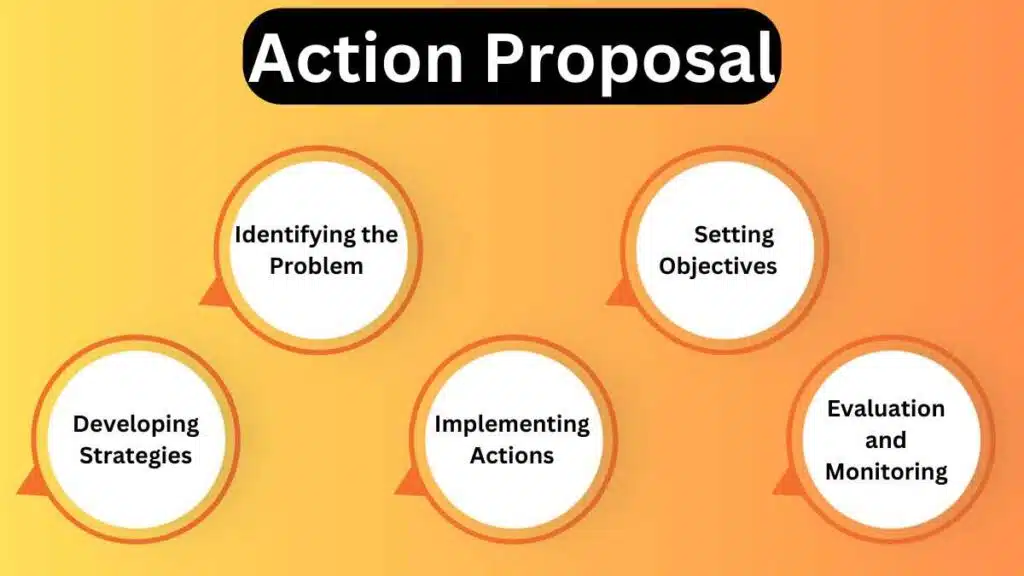Action Proposal-A Comprehensive Guide for Effective Problem Solving
In today’s rapidly evolving world taking action is crucial to overcome challenges and find solutions. An action proposal serves as a roadmap for tackling specific problems and implementing effective strategies. This article will delve into the concept of an action proposal, its significance, and how it can be applied in various scenarios.
What is an action proposal?
Action research proposals are powerful tools for problem-solving and developing positive change in various fields. Individuals and organizations can navigate challenges effectively by outlining the problem, setting clear objectives, and proposing actionable strategies.
Whether in education, business, or other sectors, action proposals provide a structured approach to address problems and achieve desired outcomes.
An action proposal is only the first step; effective implementation and continuous evaluation are vital for success. Embrace the power of action, be proactive, and create impactful proposals to drive positive change!
How to create an action proposal?
Several key components should be considered to create an effective action proposal.

Identifying the Problem
Clearly define the problem or challenge that needs to be addressed. Conduct thorough research and analysis to gain a comprehensive understanding of the issue.
Setting Objectives
Establish specific and measurable objectives that align with the desired outcome. Objectives provide direction and help evaluate the effectiveness of the proposed actions.
Developing Strategies
Identify and develop strategies that will contribute to solving the problem and achieving the objectives. These strategies should be actionable, feasible, and tailored to the context of the problem.
Implementing Actions
Outline the steps and actions required to execute the proposed strategies. Consider assigning responsibilities, setting timelines, and allocating resources to ensure a smooth implementation process.
Evaluation and Monitoring
Define methods to evaluate the effectiveness of the implemented actions. Monitoring progress and collecting data allow for adjustments and improvements to ensure the desired outcomes are achieved.
Action Research Proposal for Classroom Problems
Action research proposals play an important role in addressing classroom problems and enhancing teaching practices. These proposals involve a systematic approach to identifying, analyzing, and solving challenges that educators encounter regularly.
Teachers can actively engage in reflective practice and bring about positive changes in their classrooms by utilizing action research methodologies.
Sample Action Research Proposal in Reading
Improving reading skills is a common objective in educational settings. A sample action research proposal in reading may focus on identifying effective instructional techniques, evaluating reading comprehension strategies, or exploring ways to engage students in meaningful reading activities.
Such proposals provide educators with a structured framework to enhance reading instruction and promote literacy development.
Sample Action Research Proposal in the New Normal
The COVID-19 pandemic has brought about significant changes in various aspects of society, including education. In the “new normal” scenario, a sample action research proposal could explore strategies for remote learning. These strategies include effective use of technology in virtual classrooms, or measures to address the social and emotional needs of students in online environments.
Adapting to these new challenges requires innovative approaches and action proposals tailored to the changing educational landscape.
Example of Action Research Proposal in Education
An example of an action research proposal in education might revolve around improving student engagement or reducing achievement gaps among diverse student populations. Educators can make informed decisions and implement evidence-based practices to enhance student learning outcomes. They can do this by conducting research, collecting data, and implementing targeted interventions
Sample Action Research Proposal in Mathematics
Mathematics education is another area where action research proposals can bring about positive changes. A sample proposal in mathematics may focus on investigating effective instructional strategies for teaching complex mathematical concepts. These proposals empower educators to refine their teaching methodologies and promote mathematical proficiency among students.
Example of Action Research Proposal on Improving Reading Comprehension in Small Groups
Addressing reading comprehension challenges requires targeted interventions in a small group setting. An example of an action research proposal in this context could involve implementing cooperative learning structures, utilizing differentiated instruction techniques, or providing explicit instruction on reading strategies.
Educators can create supportive learning environments that promote reading comprehension skills.
Action Research Proposal on Congruence of Triangles
Understanding the concept of congruence in triangles is essential in the field of mathematics. An action research proposal on the congruence of triangles may involve exploring effective instructional strategies or using technology tools to enhance students’ understanding of congruent triangles.
These proposals contribute to the development of innovative teaching approaches and promote a deeper understanding of geometric concepts.
Sample Action Research Proposal in ICT
Information and Communication Technology (ICT) plays a crucial role in modern education. A sample action research proposal in ICT could focus on evaluating the effectiveness of educational apps, exploring ways to integrate technology into the curriculum, or investigating the impact of online resources on student learning outcomes. Such proposals facilitate the integration of technology into educational practices and promote digital literacy among students.



Leave a Reply